Archive before October 2024
Reggio Emilia Approach to Education Seminar Dublin Sept. 2015
A Reflection of the Reggio Emilia Seminar in DIT Grangegorman, Dublin. 25th and 26th September 2015
On arrival at DIT Grangegorman for a 2 day Seminar of Reggio Emilia Approach to Education, my first thought was ….WOW, what a beautiful environment to be in, as one walks through the grounds of this ‘Green’ Campus, which is free from traffic congestion and emits openness, trans parity and freedom of movement.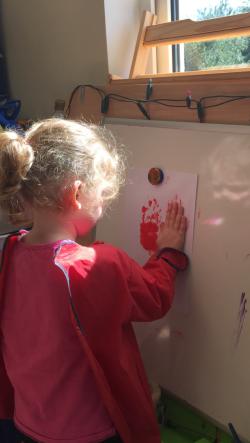 Was I already getting a good sense of what was going to be on offer at this Seminar, entitled ‘Experiences in Dialogue – the Reggio Emilia Approach’.
Was I already getting a good sense of what was going to be on offer at this Seminar, entitled ‘Experiences in Dialogue – the Reggio Emilia Approach’.
From the onset, the message was clear……”education is the right of all children and as such is the responsibility of the community.” Teresa Heeney (CEO) of Early Childhood Ireland opened the Seminar with the stark reminder of the lack of investment the Irish Government allocate for the Early Childhood Sector, she compared this to the town of Reggio Emilia, where early childhood education is recognised, valued and the importance of investment being vital. The local municipal (council) invest 14% of their total budget into Early Childhood infants-toddler and preschool centres, supporting children, parents and the educators. The importance of family participation is meaningful and valued in the centres and is vital for the humanity and solidarity of mankind. “But today is not a day for reminding ourselves of the political wrangling that goes on in our country” – Teresa went on to say that today is a day to engage in the Reggio Approach and experience the ‘Wonder of Learning’.
The guest speakers, Amelia Gambetti and Emanuela Vercalli, together, share over 25 years of experience of being involved as student, educator, parent and international relations with the Reggio Emilia Municipal Preschools. They began by outlining the history of Reggio’s educational approach, the Reggio Children’s Foundation and the Loris Malaguzzi International Centre. Amelia also spoke about her ‘anger’ of the use of the word ‘practitioner’ to describe our profession….she believes we are teachers and gifted teachers. She also believes it is the image of the child that must be the starting point for us all. The image of the child we hold, she said, is the image we have of the future. What resonated most for me during the two days was the idea that as teachers and keen observers, do we question the potential and capabilities of the children, do we allow them to hypothesis, solve problems, discover the wonder of learning rather than being ‘taught’ something.
We were exposed to beautiful images of children’s movements, drawings, voices – both verbal and non-verbal, art and construction work, and the many opportunities that they have in the environment to engage, question and explore. A simple mirror has so many possibilities, add some sunlight that shines through prisms and crystals, watch shadows dance across the floors and watch the wonder of learning for the child. Their learning journals, pictures, art, photographs were visible in every area of their class rooms, they recalled, re-discovered and used previous learning and knowledge to extend into new knowledge and understanding. The sense of freedom that was visible throughout these infant-toddler and preschools rooms which showed the flow of learning, exchange of stories, sharing of spaces, collaboration of working together, supporting each other and imitating more abled peers – it was in essence, a co-partnership between teachers, auxiliary staff, cooks, assistants, caretakers and parents. We must learn more of how TO DO with children and not FOR children.
Amelia asked us to think about our practice, what is it we wanted to change, what do we want to transform and ask yourself WHY, WHY, WHY and this will give you your direction and desire to make those changes. She explained that ‘transformation’ is painful, we must take risks, we might feel uncomfortable, unbalanced, challenged and scarred BUT this is when you know you are thinking and reflecting for the better.
Magaluzzi’s metaphor of ‘100 Languages’ was clear to be seen throughout the presentations, videos and photographs. Is it true however, we in Ireland and other countries, steal 99 of them? This gave me huge ‘food for thought’. Friday’s session ended with Dr. Carmel Brennan, ECI, reminding us of the principle of play. Play is the basis of all learning. We as educators, work from the basic principle – the right to childhood. She spoke of the cultural image we have of the child, of our childhood and spoke of ‘Scealta’ – Irish for stories, and how stories make sense of our world for us. Through play we add the narrative and through this narrative we can imagine how other ways can be in the world. Through play, we value connection, the sense of mischief, the ability to read minds and using imaginations. Carmel described the guiding influence of Reggio Children in developing our perspective on play – “We see the child as competent, an active protagonist of their own growth and development, the complexity of learning, the participation of all stakeholders, the pedagogy of listening and enquiry, the importance of the environment and the assessment as provocation for learning.”
Day 2; Sunshine beaming through the stained-glass windows of the Seminar room, we began with some videos of infant-toddler groups exploring light, shadow and reflections of themselves and others. There was much reflection and discussion after this and soon followed a video of a typical day in the life of pre-schoolers, aged 4 -6. What was so evident was the autonomy of the children in their own learning. The environment reflected the children’s lives, interests and learning and throughout there was a sense of “no matter where you come from, you are not a stranger here.” Documentation in the Reggio Emilia experience is “not for the archives, or a series of nice pictures but is a visible trace of a procedure that supports learning and teaching, making them reciprocal because they are visible and shareable.”
The role of the Teacher in Reggio was described and these are some of the statements:- ‘create a sense of belonging’, ‘be responsible for the space’, promote independence and autonomy’, ‘trust the children’, ‘do not be scarred or worried to allow them TO DO and do not be a teacher that DOES’
We heard of the immense support that Early Childhood Teachers receive in Reggio Emelia. Their continuous professional development is of the upmost importance and they receive paid time for CPD, non-contact time for planning/documenting and time for Parent/Teacher conferences. Their typical work hours are 36 -37 hours per week and 5-6 hours of these are for CPD and meetings. However, Amelia was very quick to explain that this paid non-contact time was hard fought for and took over 10 years of active action by Teachers and Unions to be recognised, valued and paid for. She explained that prior to this arrangement; Teachers did all this documentation, planning and meetings for no payment. Does this sound familiar to all Irish Early Childhood Educators and if so, are we going to ‘fight’ for this right for ourselves and for the children we care and educate? #oneunitedvoice
Amelia advised us to study the context in which we work, ask why we do what we do, ask what do we want to achieve and realise that life is difficult and complex but we must embrace the complexity and difficulties that lie before us and ensure that we as educators must have continuous professional development, from each other, from other professionals, from other fields of knowledge, in order to engage and continue to learn.
Amelia was asked about the beautiful environments that was so visible in the schools, however she explained that the environment is ‘rich’ but it is ‘poor’ in materials, explaining that all the materials in the environment are recycled, natural, shared and for many are supplied by the parents and community. She explained that they use ‘recycled’ materials, similar to those that ‘Recreate’ supply in their Dublin base unit. Recreate* were present throughout the Seminar and all the exhibits in the St. Laurence Room were made by Recreate Staff. Recreate is a membership organisation and when you are a member you are able to access wonderful materials for arts/crafts for your service.
In relation to children with Special Needs, Amelia explained, first, that they use the term – Children with Special Rights (isn’t that so much more positive and empowering) and that admission to their centres is first and foremost for children with special rights, low income families, disadvantaged families and families from abroad (did she mean refugees? I’m not sure) but what she did explain was that ‘we gain richness from the complex situations that these families bring to the centres’.
Parent participation is vital and is valued in the Reggio Emelia Approach. Parents become members of the School, elected parents are represented for each room and regular meetings are held throughout the year. Amelia acknowledged the challenges that this brings to school who do not ‘naturally’ meaningfully engage in this partnership but explained that there are a variety of opportunities where it can be achieved. Again she challenged us to embrace the complexity of our work and find the answers in ourselves. Nothing is impossible and everything is possible.
We were encouraged to use the resources around us, which includes our parents, community and our environment. Children and our settings should be visible throughout our villages and towns, and there is amazement to be shared in our community, be amazed at children’s ability and share this with your community. She spoke of forgetting about our expectations and respecting the expectations of children……she quoted a wise Pedagogical Advisor who reminded her many years ago when she was challenged in her pedagogy of teaching that “You have elephants crossing your classroom but yet you only see the ants”. I will end and leave that metaphor for you to decipher and ask you to embrace many of the elements of the Reggio Approach, the wonder of learning and the hundred languages of children and let’s NOT take away the 99 that seems to be happening for our children.
Caroline McDonnell
Early Childhood Educator & Specialist.
Professional Philosophy
My professional practice is guided by a vision of children having the best outcomes possible for their health, development and overall sense of well-being in these early years of growth. It sees children at the heart of the service but also includes their parents and families at the core of the setting. In addition, this view is shared with highly skilled and experienced staff and work together in partnership along with parents and children in order for this vision to become a reality.
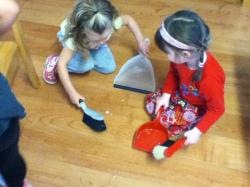 Within this view,
however, the protection and wellbeing of children is paramount, therefore,
having a code of ethics that protects them and enhances the professionalism
must be considered. Irrespective of what
the type of activity, the curriculum, policies, procedures and overall
effective running of the service, every action should be in the best interests
of the child. The vision recognises
that parents are the primary educators and carers of the children and it is
only in partnership that better outcomes, learning and development can be
achieved for the child. In addition,
the family’s culture, strengths and competencies are acknowledged, enhanced and
supported by the staff through mutual respect and trusting relationships where
all stakeholders engage in a shared openness of communication.
Within this view,
however, the protection and wellbeing of children is paramount, therefore,
having a code of ethics that protects them and enhances the professionalism
must be considered. Irrespective of what
the type of activity, the curriculum, policies, procedures and overall
effective running of the service, every action should be in the best interests
of the child. The vision recognises
that parents are the primary educators and carers of the children and it is
only in partnership that better outcomes, learning and development can be
achieved for the child. In addition,
the family’s culture, strengths and competencies are acknowledged, enhanced and
supported by the staff through mutual respect and trusting relationships where
all stakeholders engage in a shared openness of communication.
Furthermore, my views and theories include equal opportunities for all children, families and staff, with a sincere emphasis on inclusion of all cultures, religions, abilities, language, gender and ethnicity. This vision ensures that the environment and curriculum are inclusive and enabling for all children to fully participate in the activities and experiences that are offered by the staff and that emerge from the children’s interests and ideas. Moreover, that the environment and curriculum reflect a diverse representation of society. This also reflects pedagogy of contemporary perspectives in both social care and educational skills in a child’s learning and development. While my ethos is grounded in the Montessori philosophy of empowering the child to have lifelong skills, independence, ability and a love of learning that grows from a sense of wonder encouraged in the prepared environment and quality early years professionals, it also acknowledges and reflects the many varied approaches to the early years curriculum; but always ensuring that Aistear, the early childhood curriculum, and Siolta, the quality framework, is adhered to and implemented.
In respect to my personal commitment to the future development of early years, I envisage the continuation of my learning, reflection and professional development which engages in contemporary theory and practice. I also want to continue to mentor, support, encourage, inspire and share my knowledge, experiences and resources with my colleagues so that they in turn will generate a culture of continual reflection and renewal of high quality practices in early childhood.
The Early Years sector is an emerging profession and it is my hope and aspiration that society and policy makers will support us and acknowledge the very important role we play in young children’s and their families lives. As a professional Early Years’ practitioner who displays specialised knowledge, competencies and expertise following extensive training, who works in a regulated environment, provides an indispensable service, has standards of practice that is rooted in theory, follows aspirational ethical codes, is reflective and altruistic and is committed to meeting a societal need, then nothing less than being treated as a professional is required.
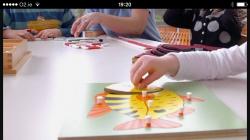
Life Cycles
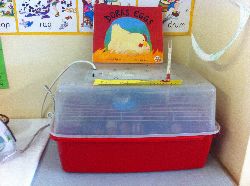
Colm's Daddy very kindly offered to give us a small incubator that would 'house' a dozen eggs for hatching in 21 days.
The temperature had to be maintained for 24 hours before placing in the eggs, along with some water to keep the humidity correct.
Finally the 12 eggs were placed in the incubator and we drew up a 21 day calendar that could be marked off each day and the children's observations recorded.
So just as in the storybook of Dora's Eggs, the children watched these motionless, pale brown, non-changing eggs for the next 20 days. The children were able to experience the feelings of loneliness and saddness that Dora felt as she made her way back to the hen house after seeing all the other animal mothers playing gleefully with their babies.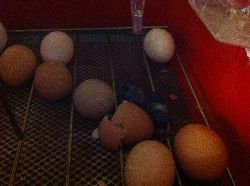
But on the 21st day, one of the eggs began to have a very small crack and we could hear a tiny noise coming from the egg also. It was very exciting but lots of children went home that day wishing and wondering would there be a new born chick hatched by morning. My 13 year old daughter Laura was even more excited (and me too) and checked the hatching eggs every 20 minutes or so. Soon midnight was closing in and both of us peered into the incubator for over an hour watching the chick peck its way out of the shell. Amazing!
The next morning was so exciting. Just like Dora, we could not wait to show off our babies. As the children arrived into preschool and went about their work, one of them went over to the incubator and squeeled with delight. 'It's a chick, it's a chick, come over everyone and look.' Carefully the lid was lifted and there was 'Chick Chick' chirping and staggering about and over the other unhatched eggs of which many more were showing cracks and holes. Before the end of the session another one had hatched and we were all looking forward to the Afternoon Group coming in to find their surpises.
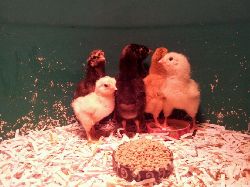 Colm's Dad returned each evening to take the eldest chick back to his farm to place into an infra red environment but continually send us photographs of updates. Before we closed for the Easter holidays on Holy Thursday six of the twelve eggs had hatched, 3 black and 3 yellow. They were all given names by the children and we are looking forward to having them back into the classroom for a day or two before they go off to various families who will have their own eggs for tea in a few weeks. Thanks Colm and Gerry for a wonderful experience for all of us at Kentstown Montessori School
Colm's Dad returned each evening to take the eldest chick back to his farm to place into an infra red environment but continually send us photographs of updates. Before we closed for the Easter holidays on Holy Thursday six of the twelve eggs had hatched, 3 black and 3 yellow. They were all given names by the children and we are looking forward to having them back into the classroom for a day or two before they go off to various families who will have their own eggs for tea in a few weeks. Thanks Colm and Gerry for a wonderful experience for all of us at Kentstown Montessori School
Linking all this learning and development that occured for the children with the early years curriculum framework, Aistear, we can see how the children became active learners, played and used hands-on experiences, their learning was relevant and meaningful while also introducing new language, opportunities to communicate and express their thoughts, ideas and feelings. 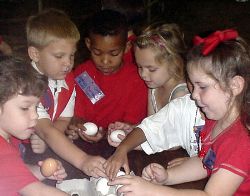 The learning enviroment involved the whole community of parents and teachers who were 'taken in' to witness what their child was discovering and witnessing. They were given appropriate responsibilties of caring for their environment and the environment of others, furthermore, their learning was more meaningful, motivating and enjoyable because the activities and experiences were based on their interests, their culture and their strengths. The children developed skills and strategies for observing, questioning, investigating, understanding, and problem-solvling and came to see themselves as explorers and thinkers. They used the written word, numeric symbols, linked picture books with their experience and most of all had fun.........then they may be asked for they did at school today and their reply is usually 'NOTHING'.
The learning enviroment involved the whole community of parents and teachers who were 'taken in' to witness what their child was discovering and witnessing. They were given appropriate responsibilties of caring for their environment and the environment of others, furthermore, their learning was more meaningful, motivating and enjoyable because the activities and experiences were based on their interests, their culture and their strengths. The children developed skills and strategies for observing, questioning, investigating, understanding, and problem-solvling and came to see themselves as explorers and thinkers. They used the written word, numeric symbols, linked picture books with their experience and most of all had fun.........then they may be asked for they did at school today and their reply is usually 'NOTHING'.







